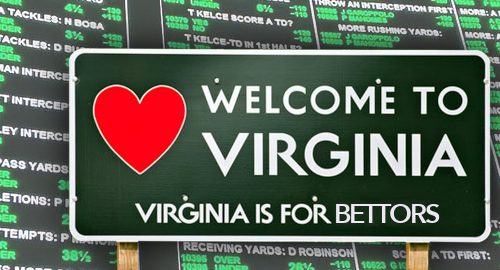 Virginia has approved new online sports betting regulations, setting up the likelihood of legal wagering commencing early in the new year.
Virginia has approved new online sports betting regulations, setting up the likelihood of legal wagering commencing early in the new year.
On Tuesday, the Virginia Lottery Board approved its regulatory framework for legal online sports betting, following passage of the necessary legislation this spring. The Lottery will accept license applications between October 15-31, with the rules dictating a 90-day window for approving or denying an application.
There will be a minimum of four and a maximum of 12 sports betting licensees, and applicants will be judged based on their wagering experience and success in other US markets, reputation for following the rules and capacity to detect “suspicious or illegal gambling activity.”
Applicants will also be judged on their estimates of the betting and tax revenue they expect to generate from their Virginia operations, as well as the number of new jobs they expect to generate in the state. Applicants will need to demonstrate “serious, good faith efforts to solicit and interview a reasonable number of investors that are minority individuals.”
Also, preferred consideration will be given to license applicants who’ve partnered with “a major league team headquartered or competing extensively in Virginia.”
Should there be more applicants than available licenses, the Lottery will qualitatively compare applicants who reside in the top two-thirds of the applicant pool. If there are any licenses left over after this process, further study will be made of the cellar-dwellers.
Successful applicants will pay a permit issuance fee of $250k, with a further $200k to be submitted shortly before the three-year permit expires. The legislation approved this spring requires operators to pay 15% tax on their betting revenue.
THE RULES
Locally-licensed bookies can’t accept wagers on games featuring Virginia college or university teams, or on the Olympic Games, the latter due to the difficulty in determining whether athletes are under 18 years of age.
Proposition bets will be allowed, except on college sports or those placed on “any type of possible injury, unsportsmanlike conduct or any other officiating call.” In-play betting on college sports is also off-limits.
The Lottery will create a list of authorized types of wagers depending on the sport, and requests to offer other types of wagers will result in the Lottery soliciting input from that sports league or governing body, which will have the right to request that such wagers not be permitted.
While operators can use “any lawful data source” for in-play betting, the Lottery will require its licensees to use official league-supplied data if a league so requests (provided such data is made available “on commercially reasonable terms”).
The leagues also won the right to compel a betting operator to provide “real-time information” regarding wagers made on their sport should a league determine that this is “necessary and desirable” for monitoring game integrity, although the operator can provide this data in anonymized form.
NIPPED & TUCKED
The regs (final version of which can be read here) went through some last-minute tweaks following consultations with stakeholders. The detailed policies regarding player self-exclusion registries were amended to remove a requirement for bettors to log on to a betting app to register for self-exclusion, which some operators rightly viewed as potentially subjecting bettors to undue temptation.
Operators also convinced the state to eliminate the need for them to submit marketing material in advance of its deployment, settling instead for a requirement to keep all material on hand in case the Lottery wants to peruse it.
The Lottery also tweaked an early proposal for betting operators to display real-time data on total betting handle and how odds were calculated. Operators felt this would gum up app performance and operators are now required to display only “the amount wagered on the bet” and “the odds at which the wager is offered.”